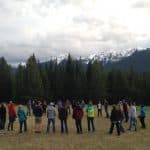Webinar Review: Balancing Technology with Nature
Webinar Review: Balancing Technology with Nature, by Natasha Burgess

Date of webinar: June 2, 2016
Very clear speaker, knowledgeable, interesting to listen to!
He seems to run webinars each week for those wanting to sign up!
Why Nature?
- Children are focused, aware, happy outdoors
- Nature is transformative for children
- Nature connection pyramid (see attached image)
- By immersing children in nature, there are significant health benefits, social/emotional benefits, developmental benefits, and environmental benefits
Less Screen, More Green
- The way we interact with technology has profound possibilities if we consciously work towards a healthy balance
- It’s no longer healthy to be the anti-tech, outdoorsy person. The more we alienate ourselves from technology, the more we alienate ourselves from children and society.
- We can no longer afford to be the aliens from planet nature.
- The purpose of technology should be to make our lives BETTER… not necessarily EASIER
Contrary to popular belief, kids do not stay indoors because of technology and social media. Rather, kids are flocking to technology and social media because they aren’t playing outdoors. They no longer have those spaces and times when they can experience true freedom, express their unique voice, and make meaningful connections. This is why the screen seems to win out over the green just about every time.
There are 3 core human desires that pull us towards technology that used to be fulfilled by unstructured outdoor play: freedom (make own decisions, risk taking, no overstructuring), voice (making a contribution and being valued), connection (belonging, meaningful relationships with groups)
- nature is not something you merely need, but something you want (kids don’t care about what they need, they want to fulfill their wants/desires)
- we need to stop talking about nature to children like a vitamin. Nature should not have to be choked down like a vitamin!
How will this allow them to experience freedom?
- In the virtual world, you can play for hours without rules or limitations
- Unfortunately the natural world seems to come with a LOT of “don’ts” (don’t walk on grass, don’t touch the rocks, use ‘museum hands’ when on a trail)
- Children need freedom to climb, collect, dig, occasionally destroy- we need to get creative about how this can be done (i.e. provide with sticks, mud, decaying log to pull apart, pinecones to pulverize
- In order to get kids engaged in nature, children must be allowed to get deeply involved in it
- We need to find ways to offer freedom
- ‘Leave no trace’ does not have to mean ‘have no fun’
How will this empower them to express their unique voice?
- Allow children to play a part in planning and execution
- Give children the opportunity to be a leader; message: your ideas matter
- Kid planned activities are usually highly successful
How will this facilitate meaningful social connections and a sense of belonging?
- Social media has changed meaning of these words: friend, play, social
- Provides illusion of society, make you feel like you are part of something
- Children want to belong, connect, so we need to find ways to help them connect outdoors
Freedom, Voice, Connections: These are the reasons children keep choosing to be inside
Building Bridges
- For some kids, making the jump from playstation to the canoe is just too much of a stretch (allow for baby steps)
3 rules for nature tech: (keep tech in check)
*All apps have to hit at least one of these rules
- Technology selected enables kids to tell stories (reporters or tell their own stories)
i.e. tweeting videos about nature experiences (great recruiting method); photographs;
sharing why something in nature is important to them
- Technology selected puts the real world first
must have hands-on component; app adds to or enriches; app that teaches about bugs from the comfort of the couch doesn’t work, but app that expands knowledge and understanding about bug they found in the garden is great
i.e. log or journal findings, chart locations (GPS for treasure hunt)
- Technology selected requires physical movement
we cannot afford to sit still any more than we have to
i.e. scavenger hunts, geocaching
Top 10 Apps:
- Project Noah
- iNaturalist
Both allow for documentation (nature journalist, citizen scientist)
- Audubon (all of their apps are fantastic- digital reference guides- approx. $10 each)
- My Nature Tracks (identifying animal tracks and scat)
- Tree Book (identifying trees- can be done by 5 year olds easily)
- Florafolio (plant identifier- vast library)
- eBird by Cornell Lab of Ornithology (gets the identity right often, fun recordings of bird songs)
- Insect ID (simple kids app for identifying insects- especially good for small children)
- Geocaching (makes it very easy and fun, quick intro into how to use it)
- Skyguide (stargazing, accurate, fast, information-rich, use out camping, use in conjuction with a telescope)
Help Me Out: 5 part webinar series (same as day long workshop) $97 US
Log in credentials (archive the set if you can’t make it, re-watch and share)
Also have access to speeches and workshops, Nature Kids video, other goodies,
complete Video Library available
No expiration date, you can share your log in code with others
Part 1: Balancing Technology with Nature (this was the first of the 5 part series)
Part 2: Redefining Play (benefits of unstructured outdoor play, single most important thing to do with children)
Part 3: Understanding parental fear and biophobia
Part 4: Nature connection across the ‘ages’ (tips for different ages)
Part 5: The Nature Connection Pyramid




